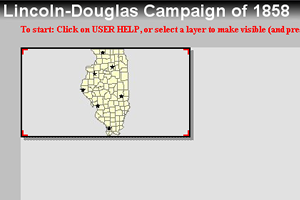One interesting aspect of John Brown’s attack on Harpers Ferry in October 1859 was the lack of a uniform response in the South. Even though Brown hoped to destroy slavery with his raid in western Virginia, southerners had a variety of responses. Many southern newspapers published articles in late October 1859 that held Republicans responsible for the violent event. These editors also portrayed the Republican party doctrine as responsible for pushing radicals like Brown and his men to attack the South. The attack and allegations of Republican support only reinforced southerners’ perspective that members of that sectional party were dangerous abolitionists who were committed to the destruction of slavery.
Yet while some southern editors predicted an increase in sectional tensions, others saw hope for the United States’ future. On November 3, 1859, the Fayetteville Observer published an excerpt from a Republican editor who expressed outrage over Brown’s actions and argued that his party “[would] return to a more national and conservative policy.” Other southern papers glossed over the factions that existed within the Republican party, but the Observer’s editor was one to highlight that not all Republicans supported violent actions. ” With “conservative Republicans cutting loose from the ultra fragments of their party,” the Observer believed “to bring the best of all good out of the late evil at Harper’s Ferry.” Radical Republicans were only “fragments” and their views did not represent those of all members in the party. While this optimistic perspective did not last, it reveals that even two weeks after the Harpers Ferry raid, not all southerners were convinced that an increase in sectional tensions were inevitable.
 Douglas Wilson’s Lincoln’s Sword won 2007’s Lincoln Prize. The book explores the power of Lincoln’s writing and his development as a writer by exploring notes, drafts, and speeches written by the president. The House Divided Project provided copies of this book to teachers attending its June 13th teacher’s workshop at Dickinson College.
Douglas Wilson’s Lincoln’s Sword won 2007’s Lincoln Prize. The book explores the power of Lincoln’s writing and his development as a writer by exploring notes, drafts, and speeches written by the president. The House Divided Project provided copies of this book to teachers attending its June 13th teacher’s workshop at Dickinson College.









